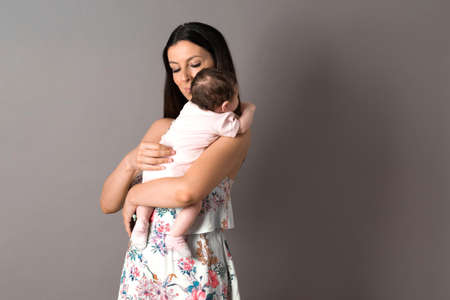Understanding Baby Coughs and Colds in the UK
As parents in the UK, understanding how coughs and colds affect our little ones is essential for their wellbeing. Babies and toddlers are particularly susceptible to respiratory illnesses due to their developing immune systems. The UKs unique climate—with its cool, damp winters and unpredictable weather patterns—can further increase the risk of coughs, sniffles, and colds, especially as little ones transition between home and nursery or other childcare settings.
Common respiratory illnesses among infants in Britain include the common cold, bronchiolitis, croup, and occasionally more serious infections like RSV (Respiratory Syncytial Virus). Recognising early symptoms can help you respond appropriately and seek professional advice when needed. Below is a table outlining typical symptoms of these illnesses:
Illness |
Typical Symptoms |
When to Seek Help |
|---|---|---|
| Common Cold | Runny or blocked nose, sneezing, mild cough, low fever | If feeding difficulties or high fever develop |
| Bronchiolitis | Persistent cough, wheezing, rapid breathing, difficulty feeding | If baby struggles to breathe or feed |
| Croup | Barking cough, hoarse voice, noisy breathing (stridor) | If breathing becomes laboured or noisy at rest |
| RSV Infection | Severe cold symptoms, wheezing, fast or troubled breathing | If signs of distress or dehydration appear |
The interplay between the UK’s chilly seasons and close-contact environments like nurseries can make it easier for viruses to spread. It’s not uncommon for babies attending childcare to have frequent colds during their first year. While this can be worrying for parents, it is also part of building a stronger immune system over time. By staying informed about typical symptoms and local health recommendations, you’ll be better prepared to support your child through common coughs and colds with confidence.
2. When to Worry: Recognising Red Flags
As parents in the UK, its natural to feel concerned when your baby develops a cough or cold. Most symptoms are mild and resolve with home care, but some signs indicate that your child may need more urgent attention. Knowing when to seek help ensures your baby’s safety and peace of mind for you.
Guidance on Identifying Serious Symptoms
Babies can’t tell us how they feel, so it’s vital to watch for particular symptoms that might suggest a more serious illness. The following table helps you differentiate between common cold symptoms and red flags that require prompt medical advice:
| Symptom | Usual Cold | Red Flag (Seek Help) |
|---|---|---|
| Cough | Mild, occasional, settles with fluids and comfort | Persistent, whooping sound, or causes distress/struggling to breathe |
| Fever | Mild (below 38°C), responds to paracetamol/ibuprofen | High (above 38°C in babies under 3 months), not settling, or accompanied by a rash |
| Breathing | Noisy but able to feed/drink as usual | Rapid breathing, grunting, chest indrawing, flaring nostrils, pauses in breathing |
| Feeding | Slightly reduced appetite but still taking feeds | Refusing feeds completely, vomiting everything up, signs of dehydration (dry nappies for 12+ hours) |
| General Behaviour | A bit unsettled but alert and responsive | Lethargic, difficult to wake, floppy or unresponsive |
| Colour | Pale but normal otherwise | Blue lips/tongue, mottled or very pale skin |
When Should You Contact Your GP or NHS 111?
- If your baby has a high fever that does not reduce with medication or lasts longer than five days.
- If they are showing any breathing difficulties or wheezing.
- If their feeding drops off significantly or they show signs of dehydration.
- If you notice a rash that doesn’t fade when pressed (the “glass test”).
Signs That Indicate Emergency Care is Needed (Call 999 Immediately)
- Your baby is struggling to breathe, making grunting noises, or you see chest indrawing.
- Your child becomes unresponsive, very drowsy, or cannot be roused.
- You notice blue lips/tongue or sudden paleness/mottling.
- Your baby has seizures/fits.
NHS Resources for Parents in the UK:
- NHS 111: For non-emergency medical advice available 24/7 via phone or online (https://111.nhs.uk)
- Your GP: For ongoing concerns during surgery opening hours.
If you ever feel unsure about your babys symptoms or simply need reassurance, never hesitate to reach out for professional advice. Trust your instincts—parents know their children best.

3. At-Home Care and Comfort
Caring for a baby with a cough or cold at home can feel overwhelming, but many British parents find reassurance in tried-and-tested approaches that focus on comfort, safety, and gentle support. Here are practical tips grounded in UK-based advice to help soothe your little one during those poorly days.
Safe Remedies for Soothing Your Baby
Over-the-counter cold medicines are not recommended for babies under six years old according to NHS guidelines. Instead, focus on safe and natural remedies that align with UK standards:
| Remedy | Description | UK Parent Tips |
|---|---|---|
| Saline Nasal Drops | Helps clear stuffy noses by loosening mucus. | Available at most chemists; use before feeds or sleep. |
| Humidified Air | Adds moisture to the air, easing breathing. | A bowl of water near a radiator works well; avoid hot steam directly. |
| Gentle Elevation | Slightly raising the cot head can help ease congestion. | Place a folded towel under the mattress (never pillows). |
| Warm Baths | The steam can help clear nasal passages naturally. | A calm bath time routine also soothes restlessness. |
The Importance of Hydration
Hydration is key to recovery. For breastfed babies, offer feeds more frequently as breast milk provides both hydration and immune support. Formula-fed babies may need extra cooled boiled water between feeds if advised by your health visitor or GP—especially during hot weather or if symptoms persist. Keep an eye out for signs of dehydration such as fewer wet nappies or dark yellow urine and seek NHS advice if concerned.
Hydration Checklist for Babies (UK Guidance)
| Age | Main Fluids | When to Offer Extra Fluids? |
|---|---|---|
| 0-6 months | Breast milk / Formula only | If feverish or recommended by health professional |
| 6+ months (weaning) | Add cooled boiled water in small sips alongside milk feeds | If showing signs of dehydration or during illness/heatwaves |
Tried-and-True Comfort Measures from British Parents
- Cuddles and Calm: Babies crave reassurance when unwell; extra snuggles provide emotional comfort and security.
- A Familiar Routine: Maintain your usual bedtime rituals as much as possible—even if they need adapting for poorly days.
- Fresh Air: If your baby feels up to it, a short pram walk in the park can help lift spirits and clear stuffy noses—just dress them warmly!
- Monitor Temperature: Use a digital thermometer to check for fever. If unsure about how to interpret results, consult your local pharmacist or ring NHS 111 for guidance.
The heart of British parenting lies in blending expert recommendations with gentle, responsive care. Trust your instincts, lean on your community (including your health visitor), and remember you’re not alone on this journey through sniffles and sneezes.
4. Safe Use of Medicines in the UK
When your baby has a cough or cold, it’s natural to want to provide relief. However, administering medicines safely and effectively is vital, especially as UK guidelines are very specific about what can and cannot be given to infants. According to NHS and NICE standards, most coughs and colds in babies do not require medication, but there are situations where certain remedies may be appropriate. Understanding these recommendations helps protect your child while promoting healthy development.
Recommended Medications for Babies
The NHS advises that over-the-counter (OTC) cough and cold medicines should not be given to children under six years old due to potential side effects and lack of evidence for effectiveness. Instead, focus on comfort measures like keeping your baby hydrated and ensuring they get plenty of rest. For symptoms such as fever or discomfort, infant paracetamol or ibuprofen may be recommended – but only when necessary and always at the correct dosage for your baby’s age and weight.
Common Medicines: Usage and Dosage
| Medicine | Minimum Age | Typical Dosage (Always Check Packaging) | Usage Notes |
|---|---|---|---|
| Paracetamol (Calpol) | Over 2 months | 2.5ml up to 4 times in 24 hours (for babies 2-3 months; increase as per weight/age) | For fever or pain; avoid exceeding stated dose |
| Ibuprofen (Nurofen for Children) | Over 3 months & over 5kg | 2.5ml 3 times in 24 hours (for babies 3-6 months; increase as per weight/age) | Avoid if baby has asthma unless advised by GP |
Cough Syrups & Decongestants
The use of cough syrups, decongestants, antihistamines, or any combined “cold” remedies is not recommended for children under six in the UK. The MHRA has issued clear guidance against these products due to risks of side effects such as allergic reactions, drowsiness, or agitation. Always check labels carefully and consult your pharmacist or GP if you’re unsure.
NHS & NICE Standards: When to Seek Professional Help
If your baby is under three months old with a temperature above 38°C, or if their symptoms worsen or persist beyond a few days, seek advice from your GP or call NHS 111. Never give aspirin to anyone under 16, and never use adult medications for children.
Summary Table: Medicine Safety Tips
| Do | Don’t |
|---|---|
| Use medicines designed for infants Check the dosage every time Consult a healthcare professional if unsure Store medicines out of reach of children |
Avoid OTC cough/cold syrups for under 6s Never exceed recommended dosages Never use adult medications Do not give aspirin to children |
By following these UK-specific guidelines and focusing on safe care at home, you can help your baby recover while supporting their ongoing health and emotional wellbeing.
5. Preventing the Spread in British Communities
When it comes to keeping baby coughs and colds from spreading within your family and wider community, practical steps are vital. UK public health recommendations focus on hygiene, responsible attendance at nurseries, and considerate behaviour in public spaces. Here’s what you can do to help protect both your little one and others:
Hygiene at Home
Regular hand washing is the cornerstone of preventing the spread of viruses. Teach older siblings to wash their hands with soap for at least 20 seconds, especially after wiping noses or handling toys shared with the baby. Clean frequently touched surfaces such as door handles, light switches, and remote controls daily.
Hand Hygiene Tips
| Action | When |
|---|---|
| Wash hands with soap | After sneezing/coughing, before meals, after nappy changes |
| Use tissues for nose wiping | Dispose immediately after use |
| Sanitise toys | Daily if shared or mouthed by baby |
Nursery and Childcare Settings
The NHS advises keeping babies at home if they have a fever or are too unwell for normal activities. Notify nursery staff about your child’s symptoms so they can monitor for further illness among other children. If your baby has a persistent cough but no fever and feels well, attending nursery may be acceptable, but always check with local guidance.
Nursery Attendance Guide (NHS Recommendations)
| Symptom | Stay Home? |
|---|---|
| Mild cough/runny nose, no fever | No (if child feels well enough) |
| Cough with fever or breathing difficulty | Yes (until feeling better) |
| Persistent severe cough/wheezing | Yes (seek GP advice) |
Public Places: Considerate British Behaviour
If you need to take your baby out while recovering from a minor cold, try to avoid crowded places such as playgroups or children’s centres during peak times. Cover your babys mouth with a tissue if they cough or sneeze, and dispose of tissues immediately. Always carry hand sanitiser and spare tissues in your changing bag.
Key Points for Parents:
- Follow NHS guidelines on when to keep children home.
- Encourage good respiratory etiquette—catch it, bin it, kill it.
- If unsure, consult your health visitor or GP for tailored advice.
By adopting these simple habits, parents not only protect their own families but contribute to healthier British communities—fostering kindness and responsibility from an early age.
6. When to Return to Nursery or Childcare
Deciding when your child is well enough to return to nursery or childcare can be challenging, especially with the pressures of work and routine. However, following British guidelines ensures both your child’s recovery and the wellbeing of others in their care setting. Understanding when it’s safe for your little one to resume social activities is essential for their continued development and comfort, as well as for minimising the spread of infections.
British Guidelines for Returning After Coughs and Colds
The NHS and Public Health England provide clear recommendations about when children can safely go back to nursery or playgroups. Generally, most coughs and colds do not require children to stay away once they are feeling better. The key consideration is whether your child feels well enough to participate in activities and does not have a fever.
General Guidance Table
| Condition | Can Attend Nursery? | Additional Notes |
|---|---|---|
| Mild cough or cold (no fever) | Yes | If child feels well and has energy for daily activities |
| Cough/cold with fever (temperature above 38°C) | No | Stay at home until fever subsides and child feels better |
| Green/yellow mucus but no other symptoms | Yes | Mucus colour alone isn’t a reason to stay home if otherwise well |
| Persistent cough after cold symptoms improve | Yes | Common for coughs to linger; can return if no fever or distress |
| Breathing difficulties, wheezing, chest pain, lethargy | No | Seek medical advice before returning to group settings |
Special Considerations for Childcare Settings in the UK
NHS guidance emphasises that children with mild respiratory symptoms who are otherwise well can usually attend school or nursery. However, if your baby is very unwell, extremely tired, or unable to manage normal routines such as eating or playing, it’s best to keep them at home until they have fully recovered. It’s courteous and protective to inform staff about any recent illness so they can monitor your child’s wellbeing during the day.
Supporting Your Child’s Emotional Transition Back to Nursery
A gentle return helps babies feel secure after illness. Take time to reconnect through cuddles and reassurance before drop-off. Let caregivers know about any changes in routine or medication needs. By following UK standards and tuning into your child’s physical and emotional readiness, you’re supporting both their health and their confidence in social environments.

